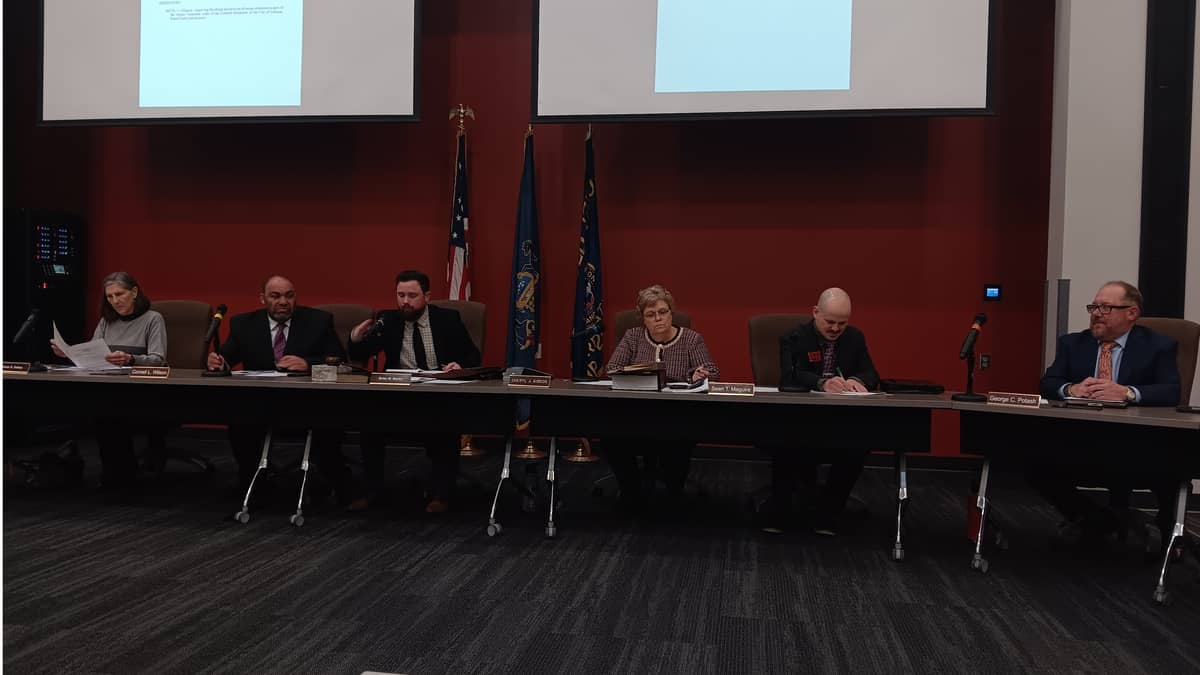Five days days of testimony concluded Monday afternoon in the trial of Kimberly Maurer, who, along with her fiance, Scott Shollenberger, is accused of killing 12-year-old Maxwell Shollenberger through starvation and a blow to the head.
Scott Shollenberger, who has already pled guilty to Max’s first-degree murder, is the boy’s natural father.
Maurer, 37, is charged with first- and third-degree murder, endangering the welfare of a minor, and criminal conspiracy with Scott Schollenberger. At the end of Monday’s court session, Judge Bradford Charles announced that he would also give the jury the option of finding Maurer guilty of the lesser offense of involuntary manslaughter.
Read More: Testimony begins in trial of woman accused of killing 12-year-old stepson
If convicted of first-degree murder, which requires proof of premeditated, specific intent to kill, Maurer will face life in prison without parole.
The prosecution’s case has featured medical and autopsy evidence, largely unchallenged by Maurer and her court-appointed attorneys, that the boy’s body showed signs of severe and prolonged malnutrition, plus recent and old blunt force head and facial trauma.
Prosecutors Pier Hess Graf and Edward McCann also presented evidence that Max never saw a doctor after age 3, was never enrolled in school by his father or Maurer, and was cut off from the world in a filthy, dark, and locked bedroom, where his feces-covered body was found on the morning of May 26, 2020.
Read More: Prosecution completes its case in trial of woman charged with killing stepson
Defense attorneys Andrew Race and Michael Light contended that Maurer did her best to care for Max and the five other children she and Scott, together or separately, had.
Her efforts to care for Max were thwarted, they maintain, by a combination of Max’s defiance and habit of urinating and defecating throughout the family’s Annville home, and Scott’s intimidating, sometimes violent behavior, and his heavy drinking, which worsened after he lost his job in early 2020.
Race also implied in his opening statement that Scott struck the blow to Max’s head that caused his death, although neither side presented evidence during trial to show how Max’s head was injured, or by whom.
Also prominent in the prosecution’s case were nearly 32,000 text messages, 7,000 pictures and videos, and over 102,000 pages of Facebook posts, downloaded by police from Kim Maurer’s phone.
Throughout the trial, prosecutors used selected portions of the data to refute the defense’s contention that Maurer treated Max the same as the other children despite his defiant behavior and her fear of Scott Schollenberger.
Kim Maurer takes the witness stand
As Race had promised in his opening statement, Maurer testified in her defense on Monday morning.
Responding to questions from Light, Maurer said she moved in with Scott Schollenberger in March 2011, and from then endured years of physical and mental abuse and control at his hands.
The first two of the three children they had together were the result of forced sex.
“It was more like rape,” she testified. Physical violence during her third pregnancy by Scott resulted in their daughter not moving in utero for two days, she recalled.
The years that followed resulted in “a lot of fighting, hitting, and hair pulling” and verbal abuse of her and the children.
Max was funny when she first met him, Maurer said, but started changing. “He was OK if Scott wasn’t around, but when Scott came home, Max would hide and talk and act like he was scared.”
Maurer said she tried to get help for Max, but when she called a counselor, whose name she couldn’t recall, “they said I was just a girlfriend and I couldn’t do anything.” When he found out, “Scott flipped out and choked me.”
Maurer also tried to get Max enrolled in school, she said. When the family was living in Lebanon, “I called Lebanon School District for Scott, but they said Scott had to fill out the application. I tried the online application, but Scott wouldn’t sign it.”
Maurer said she tried again when they moved to Annville, but the result was the same. “I felt defeated.”
Throughout questioning by her lawyer, Maurer maintained that she treated and fed Max the same as her children, and tried to deal with his urination issues and defiant behavior by talking to him and making stand in a corner or sit on the steps when he misbehaved.
Asked by Light why she didn’t just leave Scott, Maurer told the jury that he had cameras in the house and GPS trackers on her car and phone. Asked why she didn’t leave while Scott was at work, she said “he would have found me.”
On cross examination, McCann confronted Maurer with her previous statements in police interviews and excerpts from the thousands of text and Facebook messages taken from her phone, many of which appeared to contradict what she had just said on the witness stand.
Often interrupting McCann’s questions as her own words were displayed on courtroom screens, Maurer insisted that she didn’t write many of those messages, and that Scott often used her phone and must have been impersonating her.
Detective Todd Hirsch, who had testified last week, re-took the witness stand after Maurer and told the jury that Maurer had never mentioned being raped by Scott, in interviews or in any messages found on her phone, and that Maurer’s testimony on Monday was the first time he heard it.
Scott Schollenberger testified on Friday
At last Friday’s session, the defense called Max’s father, Scott Schollenberger, who last month pled guilty to his son’s premeditated murder and is serving a sentence of life in prison without possibility of parole.
Race began by showing Schollenberger the written guilty plea form he signed and asked if he admitted committing all the crimes he was charged with, including first-degree murder with the specific intent to kill Max.
Schollenberger replied with a simple “yes.”
Asked if Max had been starved and beaten, he said that he did not beat Max, “not myself.”
Recalling March 2020, Schollenberger said he was laid off, then fired from his job at Pennsy Supply following a disagreement with his supervisor. He told the jury he was then denied unemployment compensation and “felt like a man without a country.”
“Max stressed me out. I didn’t know what to do for him,” he said.
“He would go on the bathroom floor, in his pants, wherever he was,” he continued. “He was in his bedroom a lot.”
On top of that, Schollenberger testified, “there were a lot of issues in the family between Maxwell and the rest of the children and Kimberly.” Admitting that he yelled often at Max after losing his job, he said, “I hated every moment of it.”
“We didn’t know what to do,” he said quietly. “I failed. I feel guilty.”
Schollenberger described Maurer as “a good mom.”
On cross examination, prosecutors played part of a video interview Schollenberger gave to detectives shortly after Max was found dead. Asked what happened on the night of May 25, Schollenberger replied, “I have no idea. I don’t know if he ate too fast.”
What happens next?
Judge Charles is expected to begin this morning by instructing the jury on the law that applies to the case and how they should conduct deliberations.
Then the jury will begin deliberating in private in an attempt to reach unanimous verdicts on each charge against Maurer.
There is no way to predict how long it will take any jury in any case to reach a verdict.
Questions about this story? Suggestions for a future LebTown article? Reach our newsroom using this contact form and we’ll do our best to get back to you.

Support local journalism.
Cancel anytime.
Monthly Subscription
🌟 Annual Subscription
- Still no paywall!
- Fewer ads
- Exclusive events and emails
- All monthly benefits
- Most popular option
- Make a bigger impact
Already a member? Log in here to hide these messages
Local news is disappearing across America, but not in Lebanon County. Help keep it that way by supporting LebTown’s independent reporting. Your monthly or annual membership directly funds the coverage you value, or make a one-time contribution to power our newsroom. Cancel anytime.

























